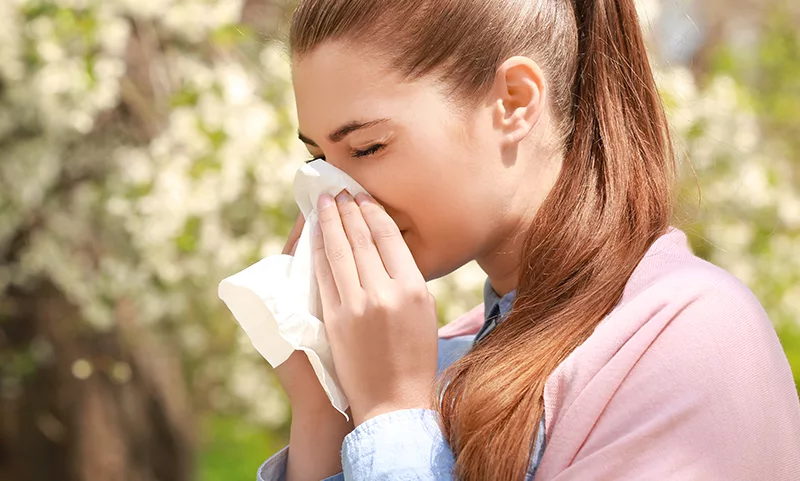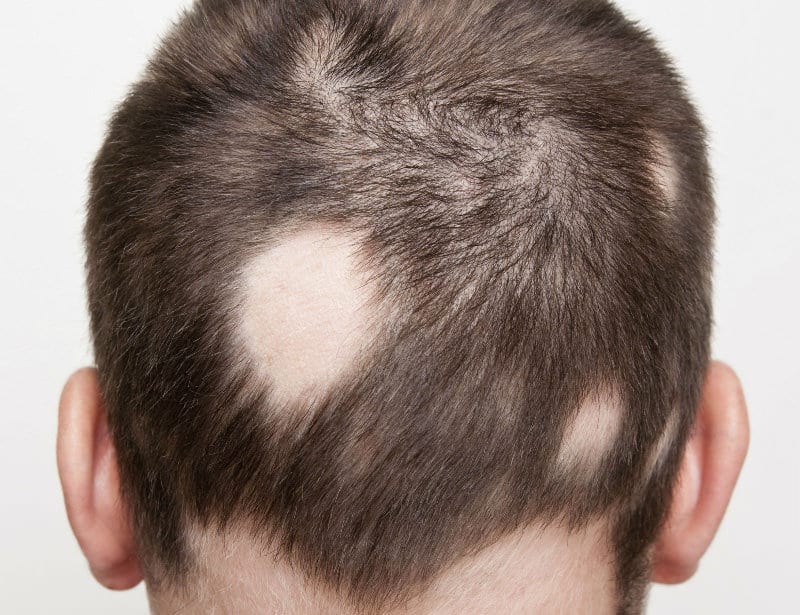Are your allergies making your hair fall out? Can allergies cause hair loss? The short answer is yes. Allergens—whether from pollen, food, or hair products—can trigger scalp inflammation and immune responses that disrupt hair growth.
This article explores how allergic reactions lead to hair loss, the different types of allergy-related hair shedding, and how to recover. You’ll also learn expert-backed treatments, timelines, and prevention strategies to protect your hair and scalp health. Let’s break it all down clearly and medically.
How Allergies Can Lead to Hair Loss

Hair loss isn’t always caused by genetics or aging. In some cases, allergic reactions can interfere with normal hair growth cycles, resulting in noticeable thinning or shedding.
Immune Response & Inflammation
When your body detects an allergen, it launches an immune response. This can lead to inflammation in the scalp, disrupting hair follicles and pushing hairs into the telogen (resting) phase—commonly known as telogen effluvium. This causes sudden, diffuse hair shedding weeks after exposure.
Allergy-Triggered Autoimmune Link (Alopecia Areata)
Certain allergies may trigger autoimmune responses. In people with genetic susceptibility, this can result in alopecia areata, a condition where the immune system mistakenly attacks hair follicles, causing round patches of hair loss.
Nutritional Deficiencies from Food Allergies
Food allergies—especially to gluten, nuts, or dairy—can cause gut inflammation, leading to poor nutrient absorption. Deficiencies in iron, vitamin D, and protein may then contribute to hair thinning.
Contact Dermatitis from Hair & Skin Products
Reactions to shampoos, dyes, or scalp treatments containing parabens, sulfates, or fragrances can cause contact dermatitis, leading to scalp irritation, itching, and eventual hair loss if left untreated.
Types of Allergies That Impact Hair
Seasonal/Environmental Allergies
Allergens like pollen, dust mites, mold spores, and pet dander are common triggers. These can cause systemic inflammation and itchy, irritated scalps—conditions not conducive to healthy hair growth.
Food Allergies
Common culprits include sesame, soy, dairy, eggs, and gluten. Besides nutritional deficiencies, allergic reactions can manifest in systemic inflammation that affects skin and scalp health.
Scalp Product Sensitivities
Hair loss may follow reactions to ingredients in hair care products such as:
- Sodium Lauryl Sulfate (SLS)
- Propylene Glycol
- Parabens
- Artificial fragrances or colors
Patch testing can help identify specific irritants.
Latex and Other Contact Allergens
Latex (found in gloves or caps), nickel, and certain preservatives can trigger localized allergic reactions when in contact with the scalp or skin.
Symptoms & When to Suspect Allergy-Related Hair Loss
Recognizing early signs of allergy-induced hair loss is key to preventing further damage.
- Itchy, inflamed, or burning scalp
- Flaking or red patches on the scalp
- Patchy or diffuse hair shedding
- Sudden hair loss following product use or seasonal changes
Comparison tip:
- Allergy-related hair loss is often acute and follows a trigger.
- Pattern baldness is gradual and genetic.
- Telogen effluvium occurs after physical or emotional stress.
Diagnosing the Cause
Accurate diagnosis is crucial before starting treatment.
Medical History & Symptom Journal
Keep a journal of new products, foods, and environmental exposures leading up to your symptoms. This helps your doctor identify potential allergens.
Allergy Tests
- Skin prick tests for food and environmental allergens
- Blood tests (IgE levels) for systemic allergic response
Scalp Exam & Biopsy
Dermatologists may perform a scalp biopsy to differentiate between allergic dermatitis, alopecia areata, or other forms of scarring alopecia.
Rule Out Other Causes
Comprehensive bloodwork can check for:
- Thyroid dysfunction
- Iron deficiency
- Vitamin D or B12 deficiency
- Hormonal imbalances
Treatment & Prevention Strategies
Allergen Avoidance
- Replace harsh shampoos with hypoallergenic or fragrance-free options
- Use air purifiers during high pollen seasons
- Avoid common trigger foods if you have sensitivities
Medication
- Antihistamines (e.g., cetirizine, loratadine) to reduce inflammation
- Topical corticosteroids for localized scalp reactions
- Immunotherapy or biologics in autoimmune-linked cases
Gentle Hair & Scalp Care
- Use pH-balanced, sulfate-free shampoos
- Avoid excessive heat styling or chemical treatments
- Gently massage the scalp to improve blood flow
Nutritional Support
- Increase intake of iron, biotin, protein, and omega-3s
- Consider a multivitamin if dietary restrictions are present
Stress Management
Stress worsens both allergies and hair loss. Incorporate:
- Yoga or meditation
- Adequate sleep
- Counseling, if needed
Recovery Timeline & Outlook
Telogen Effluvium (TE)
- Starts: 2–3 weeks after trigger
- Peak shedding: Weeks 6–8
- Regrowth: Begins by 3–6 months if the trigger is removed
Alopecia Areata
- Regrowth may take 6–12 months, depending on severity and immune suppression treatments

Scarring or Persistent Hair Loss
- If inflammation leads to follicular damage, permanent hair loss may occur
- A hair transplant might be an option in such cases
FAQs
Can seasonal allergies cause permanent hair loss?
Only in severe cases where inflammation leads to scarring.
Is hair loss from shampoo allergy reversible?
Yes, once the offending product is removed and scalp inflammation subsides.
Will antihistamines stop allergic shedding?
They help reduce inflammation, which can minimize hair loss if used early.
How long until I see regrowth?
Typically, within 3–6 months after the trigger is removed.
When should I see a dermatologist vs an allergist?
Dermatologist: If the scalp is inflamed or shedding persists
Allergist: For suspected food, seasonal, or contact allergies
Take the Next Steps
Concerned your allergies might be causing hair loss? Book a consultation with Dr. Rana Irfan in Islamabad today for a comprehensive allergy assessment and hair loss treatment plan tailored to your needs. Early intervention can prevent long-term damage—your hair health starts here.
